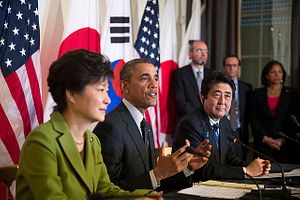In contrast to Europe, Asian countries have struggled with what President Park Geun-hye calls the “Asian Paradox.” In other words, Asian countries have fallen short of political and security cooperation despite deep economic integration.
To overcome the paradox, Park proposed the Northeast Asia Peace and Cooperation Initiative(NAPCI) as she took office in 2013. Two years later, it is a good time to review how distinctive NAPCI is, why it has been successful, and what the road ahead will be if it wants to leave a lasting mark in the region. NAPCI’s distinctive characteristics help it attract substantial regional and global interest, but it undoubtedly faces challenges down the road.
NAPCI is part of Park’s larger trustpolitik policy of replacing conflict and discord in the region with dialogue and cooperation. By fostering an arena for dialogue and cooperation at multiple levels, NAPCI aspires to build trust in the region over the long term so that peace and prosperity can be sustained. As a multilateral institution, NAPCI has won the support and participation of major countries in the region, include the United States, Japan, China, Russia, and Mongolia. At present, North Korea is not participating, but by encouraging it to, NAPCI could eventually help defusing tensions on the Korean Peninsula. Moreover, NAPCI does not aim to replace existing multilateral international institutions, but rather looks for complementary and cooperative relations.
NAPCI is distinct from other regional initiatives such as the ASEAN Regional Forum and East Asia Summit in three major ways. First, NAPCI addresses non-traditional soft security issues such as nuclear safety, energy security, the environment, cyberspace, health, drugs, and disaster management. By achieving success in less politically sensitive issues, NAPCI hopes to translate that trust into broader cooperation on hard security issues. Second, the means by which cooperation is to be achieved is different. NAPCI focuses on cultivating a habit of dialogue and cooperation, and ultimately on building trust, rather than adopting particular norms and rules. Third, NAPCI is designed as a flexible multilateral framework with co-ownership. That means there is flexibility in its structure and agenda. Any participating country can introduce an issue it perceives to be relevant and significant.
With these factors, NAPCI has been able to move beyond the conceptual stage. First, its flexibility and openness lowers the barrier for participation. Second, NAPCI appears to be non-threatening since the ROK is not attempting to challenge or change regional order. This attribute allows countries and international institutions to join NAPCI with minimum political risk. Last, but not least is Park’s political will to make NAPCI work. She has pushed NAPCI vigorously, giving it momentum for its creation and implementation.
However, the road ahead for NAPCI is not without stumbling blocks. First, cooperation on soft security issues may not automatically expand to cooperation on hard security issues. Soft security issues such as health and disaster management are arguably easier to discuss with fewer political considerations, since they neither pose existential threats nor do they affect the configuration of power significantly. However, when it comes to hard security issues that threaten a state’s sovereignty and territory, cooperation becomes harder. And for a region with as much historical baggage as Northeast Asia, it is far more challenging to find a common ground on hard security issues, even if Park succeeds in fostering trust among these countries.
Second, what actual impact NAPCI will have on the region remains an open question. Because the ultimate goal of NAPCI is to build trust rather than to write norms and rules that ultimately resolve issues, in its current conception NAPCI will remain only a first step towards cooperation, not the final destination. Trust certainly advances cooperation, but trust alone does not and cannot solve problems. The situation in Asia is more precarious than ever due to a rising China. Historically, rising powers have not been comfortable complying with existing rules; they eventually want to rewrite rules and norms like Germany and Japan did in the mid-20th century. If China has this ambition and challenges the status-quo, as is in the South China Sea and elsewhere, other NAPCI participants will need to consider how they could and should work with China going forward.
Despite the potential hitches, the significance of NAPCI should not be underestimated. It offers another forum for leaders to come together and discuss issues in depth. As John Mearsheimer has argued, it is impossible to observe other countries’ intentions with certainty because they are not tangible, but more importantly, because current actions do not necessarily indicate future actions. Today’s friends can be tomorrow’s enemies. Likewise, leaders come and go and regimes change. However, a culture of dialogue and trust can outlive individual leaders, and while trust takes time to build, NAPCI has the potential to gradually help Asian countries understand each other better and perhaps find common ground for cooperation on both soft and hard security issues.
Heajin Kim writes about East Asian issues. She was educated at the University of Tokyo and the University of Chicago.

































